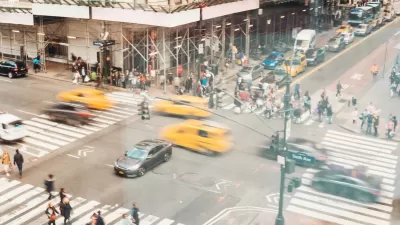A new tool from Strong Towns provides a model for comprehensively evaluating the causes behind deadly crashes and how to prevent them.

A new program from Strong Towns will introduce “a new standard of care” that would take into account a broader range of factors when assessing vehicle crashes and seek to find ways to improve outcomes rather than simply looking for where to assign blame.
“In the medical profession, adverse outcomes go through a morbidity and mortality conference, a process of internal review where all contributing factors are considered. Yes, patients are responsible for their behavior, but to what extent did the clinic or hospital—through its processes, recommendations, environment, or other actions—contribute to the negative outcome? What could have been done differently?”
Strong Towns proposes that traffic crashes should be treated in a similar way. “When a crash occurs, the public response focuses only on a few contributing factors. Was the driver intoxicated? Were they speeding? Were they distracted?” This approach fails to account for infrastructural factors and other causes of crashes. “With their new National Crash Analysis Studio, Strong Towns is creating a way for local leaders to conduct full-cause analyses of fatal crashes to understand the causes and improve future outcomes.”
Individuals or groups that want to conduct a crash analysis in their community at no cost can apply to the program, which will launch in January 2023.
FULL STORY: Introducing a New Standard of Care for Traffic Fatalities

Maui's Vacation Rental Debate Turns Ugly
Verbal attacks, misinformation campaigns and fistfights plague a high-stakes debate to convert thousands of vacation rentals into long-term housing.

Planetizen Federal Action Tracker
A weekly monitor of how Trump’s orders and actions are impacting planners and planning in America.

In Urban Planning, AI Prompting Could be the New Design Thinking
Creativity has long been key to great urban design. What if we see AI as our new creative partner?

King County Supportive Housing Program Offers Hope for Unhoused Residents
The county is taking a ‘Housing First’ approach that prioritizes getting people into housing, then offering wraparound supportive services.

Researchers Use AI to Get Clearer Picture of US Housing
Analysts are using artificial intelligence to supercharge their research by allowing them to comb through data faster. Though these AI tools can be error prone, they save time and housing researchers are optimistic about the future.

Making Shared Micromobility More Inclusive
Cities and shared mobility system operators can do more to include people with disabilities in planning and operations, per a new report.
Urban Design for Planners 1: Software Tools
This six-course series explores essential urban design concepts using open source software and equips planners with the tools they need to participate fully in the urban design process.
Planning for Universal Design
Learn the tools for implementing Universal Design in planning regulations.
planning NEXT
Appalachian Highlands Housing Partners
Mpact (founded as Rail~Volution)
City of Camden Redevelopment Agency
City of Astoria
City of Portland
City of Laramie





























